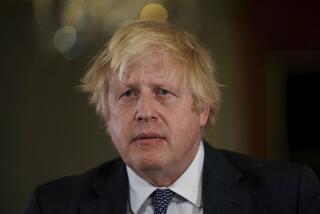Blair’s Brave New Britain--the One-Party State
- Share via
Imagine an America in which President Bill Clinton enjoys almost untrammeled power. The Republicans are reduced to a tiny rump, brain dead and rudderless, while the Democrats, newly instructed in the art of party discipline, stand at their leader’s beck and call. The think tanks, pressure groups and shock jocks of the right, once so cocky and cacophonous, have fallen silent; poor House Speaker Newt Gingrich (R-Ga.) is forced to pursue a new career as a little-league baseball coach. The media is so in awe of the president that Hillary Rodham Clinton feels free to return to her legal practice, tackling one politically sensitive case after another. To cap it all, the abolition of the 22nd Amendment means Clinton can run for president until he drops.
Adjust for national differences and that, more or less, is the state of politics in Britain. In the 1980s, when Prime Minister Margaret Thatcher was in her pomp and the Labor Party divided and irrelevant, the left complained that Britain had become a one-party state; even some Thatcherites worried that “bourgeois triumphalism” was leaving the poor without a voice. Now Prime Minister Tony Blair enjoys a sort of undiluted power Thatcher could only dream of.
British governments have traditionally been held in check by two sorts of oppositions: an official opposition in Parliament and an unofficial one in the country at large. For Labor governments, the most powerful figures in the unofficial opposition were landowners, businessmen, financiers and the Church of England, otherwise known as “the Tory Party at prayer.” For Conservatives, they were trade unionists, local-government officials and the massed ranks of the intelligentsia. The extraordinary thing about Britain under Blair is that the unofficial opposition has been destroyed even more thoroughly than the official one.
Blair has a parliamentary majority of 178 MPs--36 more than Thatcher at the height of her power--and an approval rating of more than 90%. The Labor Party, as a whole, is little more than a amen corner for Blair, the man who led it out of 18 years in the wilderness. A couple of weeks ago, the government sent out hopelessly confused signals on its plans for joining the proposed European currency, first suggesting it was on the verge of joining and then ruling out membership for the next five years. Such muddle-headedness about the most important issue facing the country would have doomed most governments to public ridicule. Instead, the government’s popularity remained rock solid.
The Conservative Party, by contrast, is in a shambles--demoralized, financially bankrupt and so bereft of ideas that it has taken to stealing Labor’s clothes, proclaiming itself the party of compassion, gay rights and single motherhood. The average member is 64 years old. The party has no seats whatsoever in Scotland and Wales and precious few in the north of England; some senior Tories even predict that, if members continue to die and resign at the current rate, the party may have no seats in the country as a whole after the next general election.
For all their enthusiasm for reinventing themselves, the Conservatives are still haunted by the rancorous divisions of 18 years of power. The recent party conference saw a parade of former Cabinet ministers apologizing for years of drift and division, and the rank and file demanding even more contrition. Yet, the divisions continue. William Hague, the 36-year-old former management consultant who replaced John Major as leader in the wake of the election, is currently engaged in a fierce battle with two party elders, Kenneth Clarke and Michael Heseltine, on the party’s attitude toward Europe, with the younger man taking the most skeptical stance.
Commentators have taken to comparing Hague’s position with that of Neil Kinnock, the hapless Labor leader who spent much of the 1980s as Thatcher’s punching bag. But, if anything, Hague’s position is even weaker than Kinnock’s, thanks to the devastation of the unofficial opposition. The Conservatives may have had Parliament to themselves in the ‘80s, but they encountered fierce pockets of resistance in the country as a whole.
The BBC was a thinly disguised fifth column, stubbornly hostile. In particular, “The Today Program,” a morning radio show that combines the authority of the New York Times with the reach of the three U.S. news networks, kept up a barrage of criticism of government cuts, ignoring that expenditures increased.
The queen made no secret of her contempt for Thatcher’s lower-middle-class certainties, and the Church of England turned against the Conservatives, repeatedly denouncing them as slaves of Mammon. The universities and intelligentsia were almost solidly pro-Labor; and Labor continued to dominate local government, particularly in the north and the big cities. At one point in the 1980s, the Greater London Council, whose headquarters was across the Thames from the House of Commons, took to taunting the government with a billboard displaying the unemployment figure.
Yet, Blair’s victory has turned these outposts of nonconformity into extensions of the central government. The mood among the intelligentsia when Labor won was akin to that among the French when the Allies liberated Paris in 1945.
The American intelligentsia has always been fairly cool toward Clinton, partly because he is a bubba from Arkansas and partly because he has veered so wildly from left to right. But for the British intelligentsia, pummeled and derided by the Conservatives for 18 years, Blair is John F. Kennedy without the sexual compulsions. Academics, who used to pride themselves on the strength of their anti-government venom, are all now busy sucking up to the new government, with Anthony Giddens, head of the once-subversive London School of Economics, sucking hardest of all.
The clergy gives weekly thanks that the Conservative scourge has been defeated; the barons of the media are more interested in dining with the Blairs than in digging up dirt on the new government, and local government councilors are all desperate to become Labor MP’s. The trade unions, who traditionally tried to bully Labor governments into giving them more pay for less work, were so traumatized by the Thatcher years that they are little more than lap dogs.
Blair even has the monarchy in the palm of his hand. The queen mishandled Princess Diana’s death so catastrophically that Prince Charles turned to Blair for advice, and they are now masterminding that ancient institution’s rejuvenation.
Perhaps it is churlish to worry about the state of British democracy. Having grown sick of the scandals of the last few years, the British are rediscovering their enthusiasm for government; after being sharply divided by Tory policies, the British are learning to be at ease with each other once again. Blair shows no signs of undoing the most sensible reforms of the Thatcher years, and few signs of introducing silly reforms of his own. His talk of modernizing Britain is harmless, if a bit vacuous, and his decision to meet with Gerry Adams, leader of the Irish Republican movement, took considerable political courage.
Yet, the concentration of power in the hands of one party and one man is troubling, however competent the party and attractive the man. In the 1970s, Lord Hailsham, a distinguished lawyer, warned that, lacking the checks and balances of the U.S. Constitution, the British political system might one day degenerate into an elective dictatorship. That day arrived on May 1, and the fact that, so far, the British people seem happy about the dictators they have elected should not blind us to the parlous state of British democracy.
More to Read
Get the L.A. Times Politics newsletter
Deeply reported insights into legislation, politics and policy from Sacramento, Washington and beyond. In your inbox twice per week.
You may occasionally receive promotional content from the Los Angeles Times.










